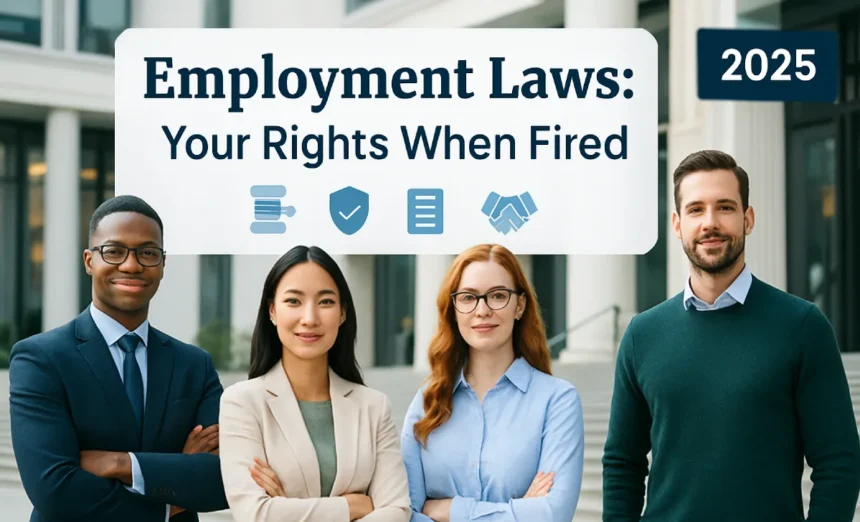Losing your job can be overwhelming and confusing. Whether you were laid off, terminated for cause, or fired for no reason, it’s important to understand your rights after being fired. Knowing what employee rights you have after termination and what steps to take under employment laws can help you move forward with confidence and legal protection.
Understanding Employment Termination in 2025
At-Will Employment Basics
Most workers in the United States are employed under at-will employment laws. This means your employer can fire you at any time, for almost any reason, or no reason at all. You also have the right to quit your job at any time.
However, at-will employment has important limits under the termination laws of 2025. As Nolo.com explains, “Although most workers are employed at will, there are many exceptions to this rule. You can’t be fired for discriminatory reasons, in retaliation for asserting your rights, or in violation of an employment contract.”
Legal vs. Illegal Termination
Not all firings are the same under U.S. Department of Labor regulations. Your employer can legally fire you for performance problems, company restructuring, budget cuts, or layoffs. These reasons may be disappointing, but they don’t break employment laws.
However, some firings constitute wrongful termination. You cannot be fired because of your race, gender, age, religion, disability, or other protected characteristics under Title VII of the Civil Rights Act and the Americans with Disabilities Act (ADA). You also cannot be fired for reporting workplace safety violations under OSHA or for retaliation against whistleblowers.
Justia notes that “Employers generally have broad discretion to terminate employees, but there are key exceptions. Federal and state laws protect employees from discrimination and retaliation, and may require notice or severance in some cases.”
Key Rights You Have After Being Fired
Final Paycheck and Unused Benefits
Understanding your rights after being fired is crucial for protecting yourself financially. When you’re fired, your employer must provide your final paycheck after termination. The timing varies by state, but it’s usually within a few days to two weeks of your last day of work under state employment laws.
Some states also require employers to pay you for unused vacation time based on your employment contract termination clauses and company policies. Sick time payouts are less common and vary by location and human resources policies.
Severance Pay – Are You Entitled?
Many people think they have automatic severance pay rights when fired. This isn’t true. Employers are not legally required to provide severance unless they promised it in your employment contract or company handbook.
If your employer offers severance under the new severance policies 2025, they may ask you to sign an agreement. These agreements often include waivers that prevent you from pursuing a wrongful discharge lawsuit. Understanding your rights after being fired includes knowing what you’re signing away with these agreements. Read any severance agreement carefully before signing, and consider having legal counsel review it.
Unemployment Benefits
You may qualify for unemployment benefits eligibility even if you were fired. The key factor is why you were terminated. If you were fired for serious misconduct, you might not qualify. But if you were laid off, fired for poor performance, or experienced termination without cause for other non-misconduct reasons, you likely can collect benefits.
Each state runs its unemployment program with different rules and benefit amounts. Apply as soon as possible after losing your job, as there may be waiting periods. You might also be eligible for COBRA insurance coverage to continue your health benefits.
Wrongful Termination in 2025
What Is Wrongful Termination?
Wrongful termination happens when your firing violates federal or state law. This includes unfair dismissal because of discrimination laws in the workplace, violations, retaliatory firing for reporting problems at work, or violation of employment contracts.
FindLaw explains that “If you’ve recently lost your job, you may be feeling overwhelmed. It’s important to know that you still have legal rights — including the right to receive a final paycheck, collect unemployment benefits, and potentially sue for wrongful termination.”
Common examples include being fired because of your age, race, or gender under discrimination laws, or experiencing constructive dismissal after you reported sexual harassment or unsafe working conditions.
New Protections Under 2024–2025 Laws
Several 2025 employment law changes have strengthened worker protections in recent years. These new laws have expanded rights for many employees after been fired for many employees. California’s SB 497, passed in 2024, creates stronger retaliation protections. If you’re fired within 90 days of reporting a labor law violation or other protected activity, the law now assumes your firing was retaliation unless your employer can prove otherwise.
California has also updated its WARN Act in 2025 with new termination notice laws, which require employers to give advance notice of mass layoffs. Companies with 50 or more employees now face stricter requirements and higher penalties for failing to provide proper notice.
At the federal level, the U.S. Department of Labor issued a new rule in 2024 under the Fair Labor Standards Act (FLSA) that provides stronger protection against worker misclassification and retaliation. This means employers face higher scrutiny when they fire workers who complain about wage and hour violations.
Can You Sue for Being Fired Unfairly?
When to Consider Legal Action
You might have grounds for a lawsuit if you were fired for illegal reasons and want to know, “Can I sue my employer for firing me?” Consider legal action if you were terminated because of discrimination based on race, gender, age, religion, disability, or other protected characteristics.
You should also consider legal help if you were fired after reporting harassment, safety violations, or other workplace problems. If your employer broke a written contract or made promises about job security that they didn’t keep, you might have a case. Labor union protections may also apply if you’re a union member.
Steps to Take
If you think your firing was illegal, start by gathering documentation and learning how to file a complaint against your employer. Save emails, performance reviews, your termination letter, and any other relevant documents. Write down what happened, including dates, times, and witnesses.
You may need to file EEOC complaints with the Equal Employment Opportunity Commission (EEOC) or your state’s civil rights agency before you can file a lawsuit. These agencies investigate discrimination and retaliation claims.
Consider speaking with an employment lawyer who can evaluate your case. Many employment lawyers offer free consultations and work on contingency, meaning they only get paid if you win.
Key Stats and Insights to Know
According to the Bureau of Labor Statistics, approximately 1.5 million workers are laid off or fired monthly in the United States. This shows that job loss is common, and you’re not alone if it happens to you, especially during periods of job loss due to economic downturn in 2025.
Government resources like your state Labor Boards, the National Labor Relations Board (NLRB), and the EEOC provide important protections and benefits for workers who lose their jobs. These agencies can help you understand your rights and get the support you need.
What to Do Next If You’ve Been Fired
Review Your Termination
Take time to think about whether your firing was fair and legal. Was it properly documented? Did your employer follow their policies? Look for any signs that your termination might have violated employment laws.
Consider whether you were treated differently from other employees in similar situations. This could be a sign of discrimination or other illegal conduct.
Protect Your Rights
Knowing your rights after being fired helps you take the right steps immediately. Apply for unemployment benefits right away, even if you’re not sure you qualify. The process can take time, and benefits often start from the date you apply, not the date you lost your job.
If your employer offers a severance package, don’t feel pressured to sign immediately. Take time to read and understand any agreements. Consider having a lawyer review them, especially if they include waivers of your legal rights.
If you think your firing was illegal, don’t wait too long to seek help. There are time limits for filing discrimination complaints and lawsuits.
Final Thoughts
Being fired can be stressful, but knowing your rights gives you power. Understanding what’s legal, what support you can access, and when to get legal help makes a big difference. Whether you’re dealing with a straightforward layoff or suspect wrongful termination, take time to understand your options and protect yourself.
Learning about rights after being fired is essential for every worker, as it helps you navigate this challenging situation with confidence. If you believe your termination was illegal or need help understanding your rights, contact an employment lawyer for guidance. Many offer free consultations and can help you determine the best path forward.
Common Questions About Getting Fired
What are my rights if I’m fired without cause?
Your rights after being fired depend on the reason for termination and your state’s laws. Even if you’re fired without cause, you may still qualify for unemployment benefits and have other legal protections. You’re entitled to your final paycheck and any benefits you’ve earned under what to do when you’re fired.
Am I owed severance pay automatically?
No, you’re only entitled to severance pay if it’s part of your employment contract or company policy. Most employers are not required by law to provide severance. If severance is offered, review any agreements carefully before signing.
Can I be fired without warning?
Yes, under at-will employment laws, you can generally be fired without warning. This is often referred to as “is firing without reason legal in my state?” and the answer depends on your state’s specific labor laws 2025. However, you cannot be fired for illegal reasons, even without warning. Some employment contracts or employee handbook termination clauses may require progressive discipline before termination, establishing just cause vs. at-will standards.
What benefits can I get after being terminated?
After being fired, you’re entitled to your final paycheck and may qualify for unemployment benefits. You might also be eligible for COBRA health insurance continuation. If you had unused vacation time, you may be entitled to payment depending on state laws and company policies.


